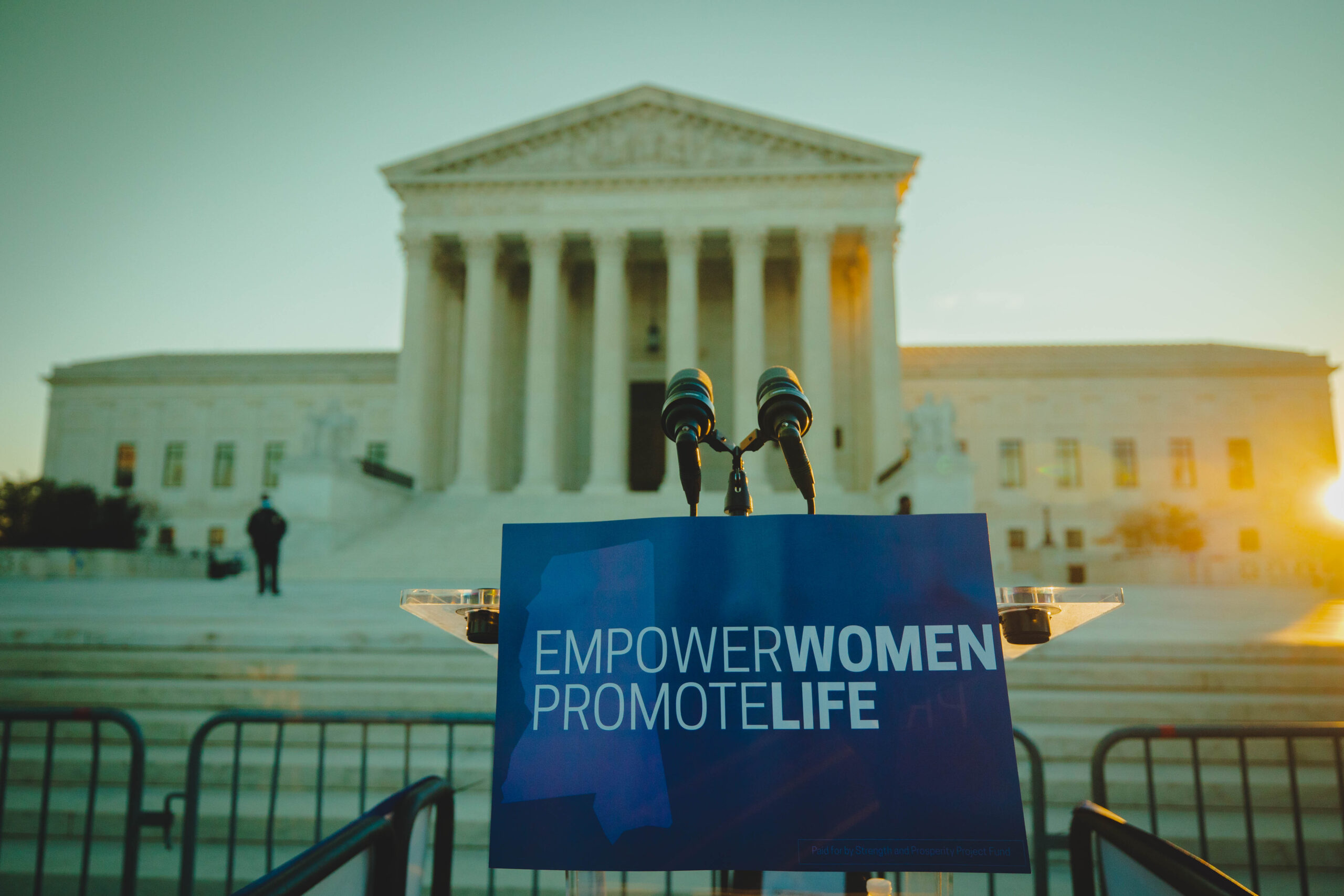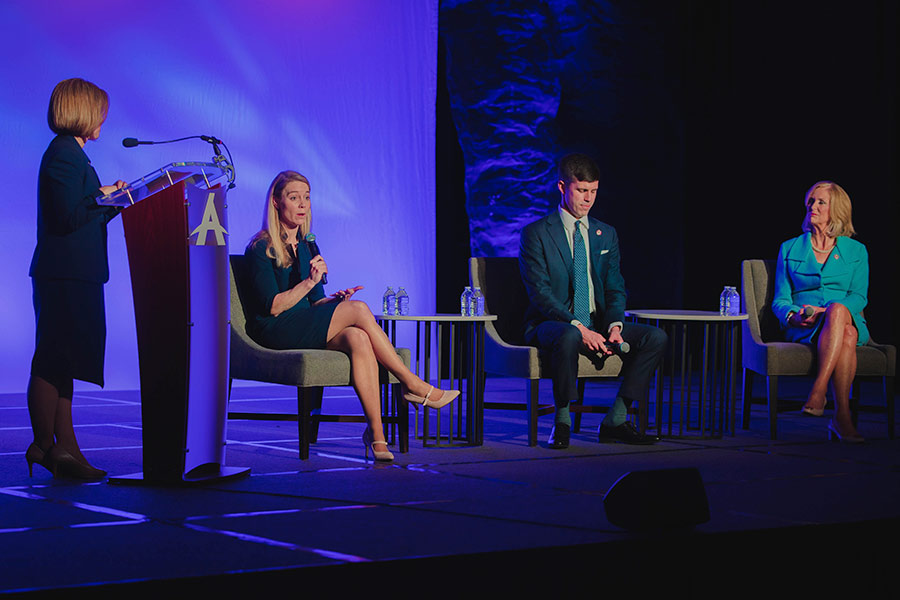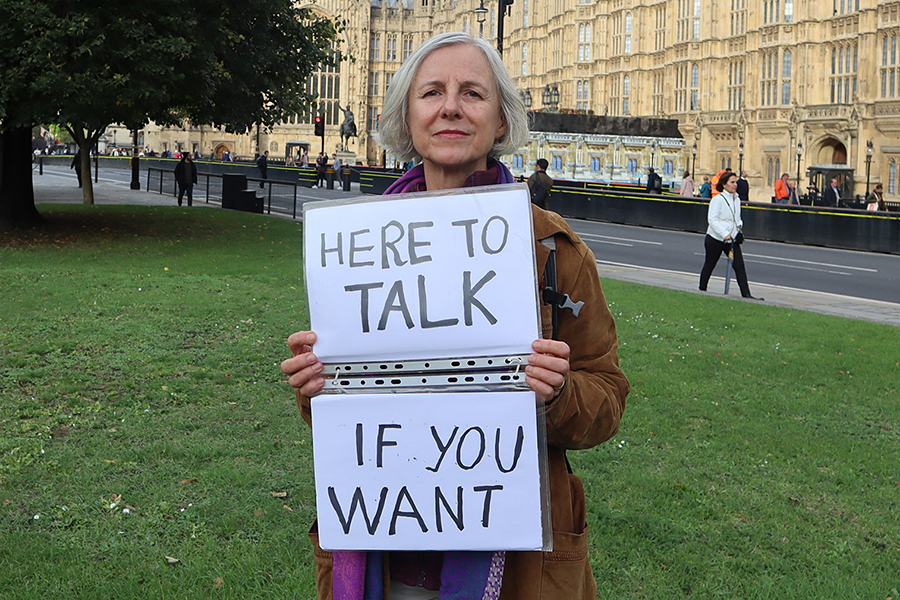
Many in the pro-life movement worked their entire lives for the day that Roe v. Wade would be overturned. On the morning of June 24, 2022, most had no idea that this would be the day.
In May, there was an unprecedented leak of a draft opinion written by Justice Samuel Alito in Dobbs v. Jackson Women’s Health Organization. Some expected the U.S. Supreme Court to release its opinion in the case immediately after the leak. And when it didn’t, Court watchers expected to hold their breath until the very end of the term.
That’s why on a Friday morning, a week before the Supreme Court’s term ended, many pro-life advocates—including those closely following the Dobbs case—did not expect to see the news that Roe v. Wade had been overturned.
But that is just how the final chapter ended for Roe.
The full story of how Roe v. Wade was overturned involves pro-life advocates from all different walks of life taking a chance to do something that many said could not be done: overturning a nearly 50-year-old Court precedent that invented a so-called constitutional “right” to abortion.
Alliance Defending Freedom attorneys and staff were proud to be involved from the very beginning, all the way back in 2017.
The history of Roe v. Wade
On Jan. 22, 1973, the U.S. Supreme Court issued its decision in Roe v. Wade.
The Supreme Court found a “right” to abortion in the U.S. Constitution, effectively legalizing abortion in all 50 states.
This decision was disastrous, leading to an increase in abortions across the country. But Roe was also disastrous for another reason: it fundamentally misread the Constitution. Despite the bad jurisprudence, however, opposition to the Roe decision on constitutional grounds was largely quiet. A movement of originalists and textualists, or those who believe courts should base their judgments on the vision of the Founding Fathers and the text of the Constitution, would gain momentum nearly a decade later in the 1980s.
At the time, the prevailing idea was that opposition to Roe v. Wade would eventually go away. Now that abortion was the law of the land, Americans who opposed abortion would either change their minds, give up, or simply die out.
But as we all know, things went very differently.
In addition to creating a “right” to abortion in the Constitution, the Supreme Court had circumvented the democratic process by taking decisions about regulating abortion away from the states, where citizens could vote according to their policy preferences. Without the process of federalism, the abortion debate was nationalized—and thrust into the court system—with each side digging in its heels.
The pro-life movement’s number-one goal became to overturn Roe v. Wade. This felt like a monumental if not impossible task.
In the early 1990s, pro-life advocates had the first glimmer of hope with the case Planned Parenthood v. Casey, which involved a Pennsylvania law implementing commonsense protections for women. Unfortunately, in 1992 the Court issued a devastating blow to the pro-life movement in its decision in Casey. Not only did the Supreme Court uphold Roe v. Wade; it actually doubled down and added a new “viability” standard to assess whether a state’s abortion regulations imposed an “undue burden” on a woman’s so-called “right” to abortion.
To many in the pro-life movement, the idea of Roe v. Wade being overturned seemed like a nearly impossible goal. But in 2018, that all began to change.
The Mississippi law that would overturn Roe v. Wade
Every pro-life law that made its way to the Supreme Court gave pro-life advocates some hope that Roe v. Wade could finally fall. Unfortunately, in so many cases (such as June Medical Services v. Russo) those hopes were dashed.
So when the Mississippi legislature passed a pro-life law in 2018, many expected more of the same.
It may have seemed like another effort doomed to fail when state Rep. Becky Currie introduced the Gestational Age Act in the Mississippi House of Representatives. After receiving significant bipartisan support, the bill was passed by both chambers of the Mississippi state legislature.
The law was born out of a model bill drafted by ADF in 2017. The model bill protected life at the 15-week mark to serve three compelling state interests: to protect unborn human life, to advance women’s health, and to safeguard the integrity of the medical profession.
Mississippi’s law took into account the latest scientific evidence on fetal development to protect unborn children after 15 weeks in the womb. These babies have heartbeats, can move around and kick, open and close their fingers, hiccup, and likely feel pain. The law also considered the increased medical risks to mothers from abortions after 15 weeks.
On March 19, 2018, Gov. Phil Bryant signed the Gestational Age Act into law. At the signing, the governor joked that “we’ll probably be sued here in about a half hour, and that’ll be fine with me. It is worth fighting over.”
Shortly after the law was passed, the state’s only abortion clinic, Jackson Women’s Health Organization, sued the state.

The journey to the Supreme Court
In June 2020, Mississippi asked the Supreme Court to weigh in on the case. The U.S. Court of Appeals for the 5th Circuit had just ruled that states cannot pass laws like Mississippi’s that limit abortion before the point of viability (the point at which a baby can survive outside the womb).
The “viability” standard comes from the Supreme Court’s decision in Casey, which modified the “trimester” framework established by Roe. At the time Roe was decided, viability was considered to be around 28 weeks, and by 1992, that had decreased to 23 to 24 weeks. But thanks to advances in obstetrics and ultrasound technology, we now know even more information about the child forming in utero. And today, viability is understood as between 21 and 22 weeks. Clearly, it was well past time to reconsider the viability standard.
Not only that, but the poorly reasoned Roe decision took away the debate on abortion from the people and their state governments by creating a so-called constitutional “right” to abortion, as pro-life advocates had long argued.
For these reasons, in May 2021, the U.S. Supreme Court agreed to hear Dobbs.
ADF’s appellate team provided support to the Mississippi legal team as they prepared to argue the case in front of the nine justices. On Dec. 1, 2021, Mississippi Solicitor General Scott Stewart argued before the Supreme Court.
Pro-life advocates had yet another case that could possibly overturn Roe. But this case turned out to be nothing like the previous abortion lawsuits that those invested in the abortion debate had followed.
In May 2022, there was an unprecedented leak. A draft of a majority opinion written by Justice Alito was published by the press. The draft opinion would overturn Roe.
Social media erupted. Activists began staging protests, and some even threatened the safety of the justices, implying that any justice who voted to overturn Roe would be in danger.
Supreme Court watchers had no idea what to expect. Would the Court release an opinion immediately following the leak to put a stop to protests? Or would the Court wait until the end of the term in June as it typically does? And, in either case, would the draft opinion be the final opinion released by the Court, or would the justices go in a different direction?
On June 24, 2022, the Supreme Court gave us the answers by releasing its opinion in Dobbs. Like the draft leaked to the press, the official opinion was authored by Alito and overturned Roe v. Wade.
Alliance Defending Freedom provided expert testimony post-Dobbs
As pro-life advocates rejoiced at the end of Roe, pro-abortion activists and many in the establishment media flew into a frenzy.
Myths about the case, the ruling, and even the nature of pregnancy began to circulate. That’s where ADF experts stepped into the Dobbs case once again. [Read more about the myths and facts regarding Dobbs here.]
Many in the media claimed that the Dobbs decision “took away” a constitutional right to abortion. ADF Senior Counsel Denise Harle set the record straight when she testified in front of the U.S. Senate Judiciary Committee on the legal implications of Dobbs.
Former ADF client and pregnancy center director Heidi Matzke testified alongside Harle to dispel misinformation about pro-life pregnancy centers.
Another pernicious myth circulating after the Dobbs decision was that medical care after an ectopic pregnancy or miscarriage was now somehow illegal post-Roe. ADF Senior Counsel Erin Hawley, who also served alongside the Mississippi legal team in Dobbs, addressed these falsehoods when she testified in front of the House Oversight and Reform Committee.
You can read Hawley’s full testimony here.
The future of the pro-life movement
It’s hard to overstate the significance of the Dobbs case. Roe v. Wade has finally been overturned. But this does not mean the work of the pro-life movement is over—far from it.
The abortion debate has been returned to the people, and now it is up to us to win over the hearts and minds of citizens to vote and legislate to protect life in their individual states. Some states already had protections for unborn children on the books that went into effect after Roe was overturned. Others had pro-abortion provisions written into their state constitutions.
ADF CEO, President, and General Counsel Kristen Waggoner explained what the post-Roe legal landscape will look like in the coming months:
No matter what may come, Alliance Defending Freedom rejoices alongside others in the pro-life movement over the victory in Dobbs. It is a testimony to God’s faithfulness that the overturning of Roe v. Wade, something once thought nearly impossible, occurred during our lifetimes.
But, most importantly, we are grateful that the Supreme Court’s decision is protecting women and unborn children from the evil of abortion.




